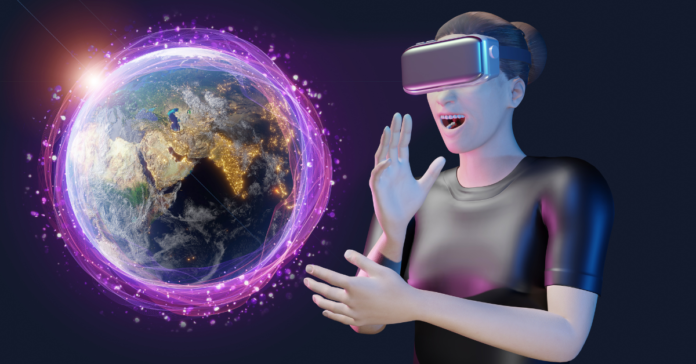What is the Metaverse?
The Metaverse is a vast digital world. It blends physical and virtual spaces. Users can interact in 3D environments. People can create avatars, experience immersive simulations, and communicate beyond traditional internet boundaries. The vision is for people to engage in digital spaces. They should socialize, shop, learn, and work there.
How the Metaverse Evolved
While the Metaverse may feel futuristic, its roots stretch back decades. In his novel Snow Crash, Neal Stephenson envisioned a virtual world unlike any before, blending reality with an immersive digital landscape. Users could escape into a shared virtual world. Today, advancements in VR, AR, and AI have made this concept increasingly tangible.
Leading Players: Major tech firms, like Meta, Google, and Epic Games, are investing heavily in the Metaverse. Blockchain projects like Decentraland and The Sandbox show decentralised approaches. Users have the freedom to create, trade, and possess digital assets. They illustrate the Metaverse’s potential for growth in many directions.
Key Technologies of the Metaverse
Creating a fully immersive Metaverse requires many advanced technologies:
- Virtual Reality (VR): Virtual Reality (VR): VR immerses users in computer-generated worlds. It fosters a feeling of actually being present.
- Augmented Reality (AR): Augmented reality (AR) integrates digital elements into the physical world by projecting them through smart glasses. This creates a hybrid environment.
- Artificial Intelligence (AI): AI enhances realism, supports language translation, and facilitates dynamic interactions.
- Blockchain and NFTs: Blockchain technology ensures secure, decentralized control over digital assets, while NFTs provide distinct ownership records for virtual goods.
- 3D Modelling and Spatial Computing: 3D modeling creates detailed, lifelike environments. They are essential for an immersive experience.
These technologies create a seamless Metaverse. They allow users to switch between digital worlds.
Real-world Applications of the Metaverse
The Metaverse offers wide-ranging applications across various fields:
- Social Interaction: Meta’s Horizon Worlds offers a virtual space for users to socialise and engage. It fosters a community beyond traditional social media.
- Gaming and Entertainment: Games like Fortnite and Roblox are now mini-metaverses. They host events and concerts that blend social and entertainment experiences.
- Virtual offices are brought to life by remote work tools like Meta’s Horizon Workrooms and Microsoft’s Mesh for Teams. They enable remote teams to engage and interact more naturally.
- Education and Training: VR-based platforms like ENGAGE provide virtual classrooms. They enhance student engagement through immersive learning. The medical and engineering sectors also benefit from VR simulations for hands-on training.
- E-commerce and Retail: Both Gucci and Nike have introduced digital stores on Roblox, allowing users to explore and interact with virtual products within the gaming platform. Users can try products in them, making shopping more interactive.
Blockchain and NFTs: The Metaverse Economy
Blockchain technology and NFTs play a central role in driving the economy of the Metaverse.Decentraland and The Sandbox let users buy digital assets and own virtual real estate. NFTs record the ownership of unique items, while blockchain ensures secure transactions. This decentralized economy enables creators and consumers alike to actively participate and thrive. It enables true ownership and ways to make money in digital spaces.
How the Metaverse is Shaping Society and Challenging Our Ethics

The Metaverse introduces vast possibilities but also poses societal and ethical challenges.
- Increased Access: The Metaverse provides expanded opportunities for education, work, and entertainment. Individuals in isolated or underserved regions could gain access to previously unavailable resources.
- Privacy and Data Security: As technology becomes more immersive, so do privacy concerns. Collecting data for personalised experiences may risk security. It requires clear standards for consent and data use.
- Mental health: A long time in virtual spaces could harm mental health. So, we must consider the effects of an immersive digital environment.
Significant Challenges in Building the Metaverse
Building an integrated, functional Metaverse involves navigating many obstacles.
- A successful Metaverse needs interoperability. It must allow users to move freely between virtual environments. Universal standards for data and interaction consistency are essential.
- Technical demands: Real-time interaction needs advanced infrastructure. This includes high-speed internet, powerful processors, and responsive technology. The quality and seamlessness of the interaction depend on these. Overcoming these technical challenges will be key to ensuring smooth user experiences.
- Regulatory and Ethical Oversight: As the Metaverse grows, it will need regulation. This includes digital property rights and user safety. Governments and corporations must address the ethics of digital behavior and IP.
- Inclusivity and Accessibility: It’s crucial that everyone can take part in the Metaverse. Developers should create affordable access options and an inclusive design. Also, they should make customisable avatars to boost diversity and representation.
The Future of the Metaverse
The Metaverse will evolve. It will continue to change the digital world.
- Healthcare and Therapy: VR healthcare apps will grow. They will offer remote therapy and even surgical training in immersive environments.
- Enhanced Personalisation: AI will let virtual spaces adapt to users. This will create hyper-personalised experiences that reflect individual tastes and needs.
- Digital Job Creation: As virtual spaces grow, jobs will emerge. Jobs like Metaverse developers and virtual space designers will be common. So will digital asset managers.
- Expanded E-Commerce: Virtual storefronts will offer more interactive shopping. They will let consumers experience products in new, engaging ways.
Will the Metaverse Replace the Internet?
The Metaverse introduces an enhanced dimension of digital interaction, creating immersive and interactive experiences beyond traditional online engagement. But it will not replace the internet. Instead, it will be an extension. It will provide immersive 3D experiences alongside traditional browsing.
Conclusion
The Metaverse will reshape our digital experiences. It will combine VR, AR, AI, and blockchain to create spaces where the real and virtual worlds merge. The Metaverse is still evolving. But it offers new ways to socialise, learn, and work. The Metaverse has great potential as tech advances. But we must address ethics and access issues. This is crucial to ensuring a safe and welcoming digital world for all. For further exploration, visit Meta’s Metaverse page.


